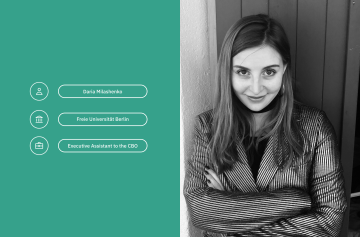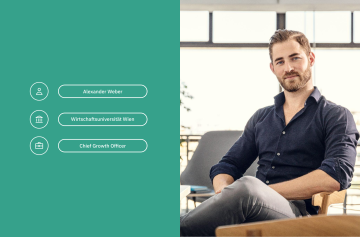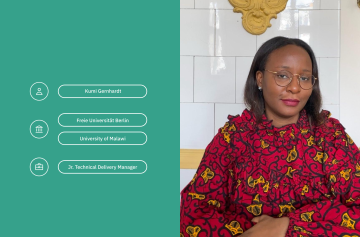
COO & CFO Jan Kemper on the most important skill he learned at university
Team spotlight: Jan Kemper loved uni—so much that he never really left! Learn how this former investment banker balances his roles as a C-Level, Assistant uni professor, and founder.
10 min read
If you ever feel like your life is too busy, imagine walking in Jan Kemper’s shoes. He’s been an investment banker with Credit Suisse, Goldman Sachs, and Morgan Stanley—and a globe-trotting backpacker. After nearly becoming a professional badminton player, he went on to co-found a triathlon clothing company—with an Ironman world champion as co-founder, no less! Then there’s his impressive career in the tech startup scene: CFO at Groupon and at Zalando, CFO/CIO and Executive Board Member at ProSieben, Managing Director (CFO/COO) at Omio Corp—the list goes on. And there’s more: Jan is an Assistant Professor at RWTH Aachen University, where he received his doctorate in 2010. Oh, and did we mention he recently started organic farming and forest recultivation, and runs a seminar hotel in Brandenburg? If you ask Jan how he keeps up with everything, he says much of the mental flexibility needed to thrive in such a fast-paced career all started back in college at WHU (Otto Beisheim School of Management). We sat down with Jan to talk about his studies, career, and much more. Our interview has been edited and condensed for clarity.Can you start out by telling us a little bit about yourself—where you grew up, and what you were interested in before heading to college?I grew up in a small town in the west of Germany called Aachen, close to the Belgian and Dutch borders. I played semi-professional badminton—in fact, I was a prospective Olympic squad member for 2004 and 2008. But, at a certain point, I had to decide whether to commit myself fully to the sport—meaning I would have had to practice for four years to eventually, maybe qualify for the Olympics. I decided to head to university instead. That must have been a difficult choice to make. How did you decide which university to attend? Well, I chose a very small university, WHU (Otto Beisheim School of Management) in Vallendar/Koblenz, and focused on business administration and economics and went on to do my master’s in Accounting, Finance, and Operations. WHU is the most reputable university in Germany for the fields I wanted to pursue, but for me it was more the idea of going to a village where I could really cut my ties with badminton. I knew that if I went to Cologne or Munich, there would always be a club where I could continue to play, and I wanted to fully commit myself to my studies.I also wanted to go to a university where I could learn as many languages as possible and spend a lot of time abroad. In the end, I left WHU speaking six and a half languages and having spent three to four months abroad each year. For example, I lived in Washington D.C., Mexico City, Madrid, and Bordeaux, all during my studies. Just to spend time in different countries, work there, learn new languages—it was amazing. What made you gravitate toward business administration and economics? First off, it gave me a lot of options. I wasn’t entirely sure what I wanted to do yet, and I knew that with a business administration degree, the career opportunities are vast, meaning I could figure it out along the way. I also have important role models in my family. On one side is a long line of doctors. On the other side were coal miners, including my grandfather. He once said to me, “Jan, I may not be the smartest guy on earth, but I can work hard. And I do that so that the next generation has the chance to get access to better education and succeed.” Thanks to his hard work, my mother and her sister were the first in their family who didn��’t have to leave school after 9th grade. So he said, “Jan, don’t screw it up!” That had a big impact on me. What are some strong memories you have from your time in undergrad?The thing is, because it was a private university, our schedules were very organized and planned out in advance. It was also a very small school—there were only 85 people in my class, so we all knew one another. The first person I met there is still one of my best friends, and some of my closest friends are people I met during that time. I have great memories of uni events where, as first semester students, we would each showcase our skills (mine was rapping!). The professors I met back then are very close to my heart, too. One of them, Malte Brettel, became my advisor in Aachen, where I went on to get my PhD.You mentioned the extensive time you spent abroad during your studies. Can you speak a little bit to this experience? Were there any challenges you encountered?After four semesters in Koblenz, I spent two semesters in Bordeaux, France, where I did my MBA, then another semester in Madrid. My time in Spain was easier—I’d already worked as an intern in Mexico City the year before, so my Spanish was fluent. With French, however—I crossed the French border and wasn’t really able to articulate myself. You see, in order to get into that university, you needed to speak two foreign languages, and I had memorized some basic French grammar and somehow snuck in. So, I got to class—and I’m not exaggerating here—for the first two months, I didn’t understand what they were talking about at all! Eventually I caught on, but that was the most eye-opening and scary part of my studies: sitting there, in a new country, trying to organize myself, and not understanding what anyone is saying. But in the end, I had a wonderful time and made really good friends there. Bordeaux is just amazing—you can surf in the Atlantic, drink good wine—and believe me, we made good use of both!How did your professional life kick off? After I finished my master’s, I went into investment banking. I felt that I still needed someone to kick my butt and improve my project management skills. It wasn’t really cool to be a banker back then—but for me it was fun. My language skills really came in handy, because my bosses discovered that they could send me into data rooms. Back then they were physical instead of digital, so I was sent across Europe to go through these massive data rooms with documents in English, German, Italian, Portuguese, and French. At some point, you decided to return to university and get your doctorate. Can you talk a little bit about that journey? Yes, after three and a half years in banking, I decided to get my PhD. On the one hand, I needed to be close to home for a while, but I also wanted to dedicate myself fully to one topic and dive deep. I chose my hometown university, Aachen, where an old professor from WHU had come to set up a chair. After a few months of playing Mario Kart and just enjoying being my own boss again, I finally found my Ph.D. research topic. What was it?I studied the value located within social networks: the people you meet in kindergarten, school, family, friends—all the people around you in concentric circles. I was essentially thinking about traits that span from the personal level and move to the corporate level, and how to actually measure them. I did my research in four countries—Germany, the US (in cooperation with Stanford University), in Shanghai (in an exchange with Tongji University), and in Hong Kong. After two years, I received my doctorate. And I’ve stayed at university in Aachen ever since, giving lectures twice a year, becoming a professor myself in the fields of Technology, Innovation, Entrepreneurship, Operations, and Finance and mentoring doctoral students. This year, I will finally receive tenure! Wow—that’s a massive achievement! In addition to being a professor in Aachen, you’ve built a successful career in the startup scene, working at Groupon, Zalando, and ProSieben before joining N26. How do you do it all? I like to do a lot of things! What’s more, I believe that keeping busy helps me to become better and stay focused. I work very long hours at N26, but two hours working on a Ph.D. topic helps me clear my mind so that I come back to my role refreshed. I also retained my commitment to sports. I still compete in triathlons, however this has slowed down since my kids were born. To compensate I co-founded the triathlon clothing company Ryzon in Cologne together with Jan Frodeno. But my most recent project is that, two and a half years ago, my wife and I bought a farm outside of Berlin and transformed it into a hotel, horse stable, restaurant, and location for seminars, offsides, and other events. We started organic farming, bought a lake and some forest in order to re-cultivate it. And that is, in my spare time, the biggest project at the moment. I underestimated how much work it would be, but it’s a lot of fun.You joined N26 as the CFO in July of 2021, and took over the role of COO in January of this year. Can you talk a little bit about your role at the company?Sure. I started as CFO, taking care of all financial stuff—getting the monthly reports together, managing the balance sheets, and explaining the company’s costs to our shareholders. But I also really help steer the company. This includes managing and setting up budgets, re-forecasting, helping people in the different functions—from marketing to growth to product—better understand what’s going on in their teams by reading and interpreting data, budgeting reports, and the like. And the bigger the company gets, the more complex and professional the scope becomes.In the Operations department, we take care of everything from customer support to banking operations to financial crime operations. So, I basically make sure that the operating “machine” that’s needed to run this funky, tech-driven company without any hiccups is functioning as it should, especially in a highly regulated environment. What’s your favorite thing about your job?My favorite thing about my job at N26 is to work for and learn from people who are smarter than me. I would consider myself, at least in my team, the broadest generalist. But for me, the one thing that gets me out of bed each day—and the reason why I do so many things—is that I want to learn. And here, day-in, day-out, I’m consciously framing my role like that: working for and learning from smart, ambitious people. Looking back, what are some lessons that you took from your time at university? Great question. If I had to pick one, it would be this: content is important, but it’s more about learning the concepts, ways of thinking, and systems that you need to approach, structure, and solve problems or challenges. In the environment of a large startup and scale-up, nothing is predictable—there’s no blueprint for what you’re building. You may know the techniques, but you're constantly confronted with challenges that nobody has ever faced before. That’s something I learned at university. At the beginning of my studies, it was mostly about memorizing stuff and putting it on paper. But the more you advanced, the more it became about concepts, how to approach things, how to structure and push ideas forward. And that was something that over the years, across many companies and projects, has given me the strength to know that, no matter what comes my way on a daily basis—I believe I can solve it. That sounds like such a valuable skill. Absolutely. Every week on Sunday, I sit down and ask myself what are the top 10 to 15 things I want to accomplish this week. Then, on Friday of that week, there are still 12 things, but I accomplished maybe 20 things. Unpredictable stuff happens all the time—so you need that mental flexibility. And I first learned that at university.
Find similar stories
BY N26Love your bank
Related Post
These might also interest youINSIDEN26Team spotlight: Daria Milashenko, Executive Assistant to the CBOWhen Daria Milashenko, Executive Assistant to the CBO at N26, visited Berlin at 15, it was love at first sight.
9 min read
INSIDEN26CGO Alexander Weber on the practice and profession of entrepreneurshipNow our CGO, Alexander Weber has been with N26 for nearly 8 years. Learn how he decided to study business and why he thinks being an entrepreneur is about vision, passion, and intrinsic motivation.
8 min read
INSIDEN26Jr. Technical Delivery Manager Kumi GernhardtKumi’s career has taken many twists and turns—from a career in journalism to a Technical Delivery Manager at N26. Read on to learn how her passion for communication helped her forge her path.
8 min read


